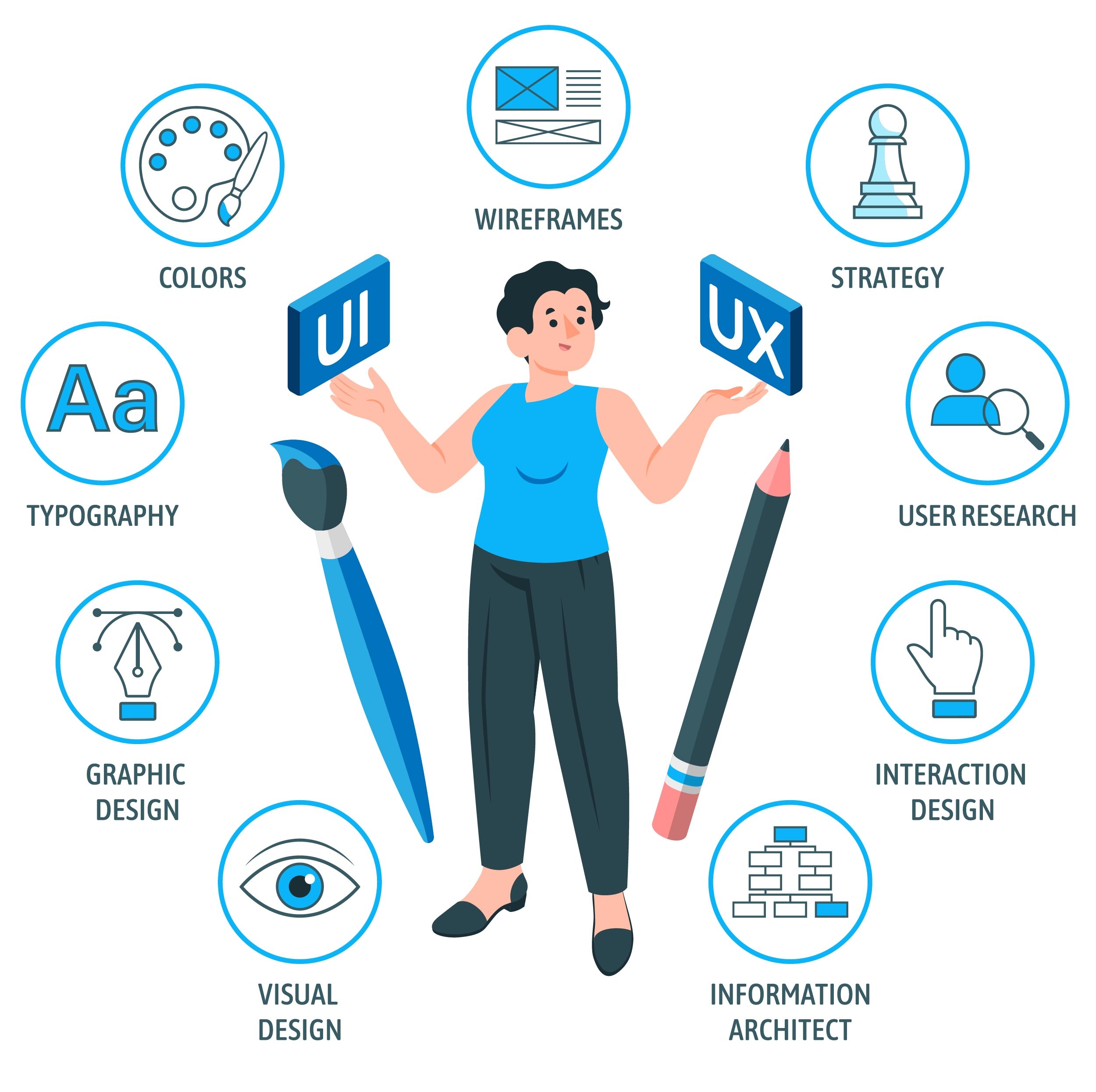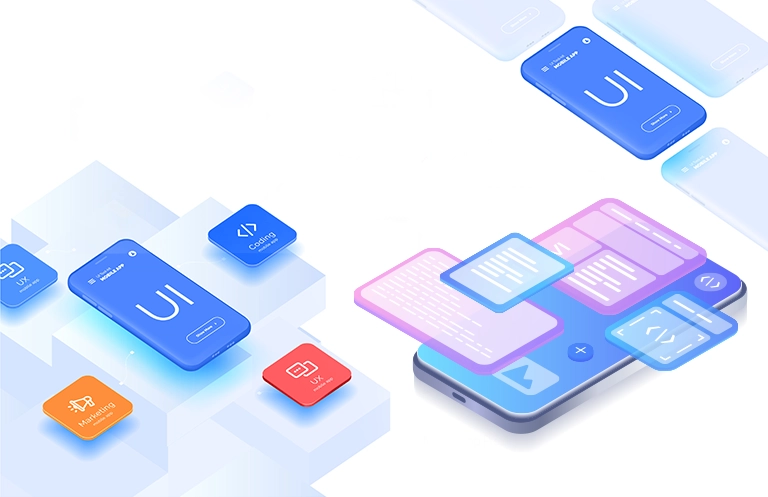User Experience (UX) design is essential for success in today’s digital world. Research indicates that companies focusing on UX can see retention rates up to 400% higher than competitors (Forrester) and experience revenue growth twice the industry average (McKinsey). However, it is not just numbers — think one-click purchases with Amazon or the consumer-focused design for Airbnb. This blog aims to inform you about the importance of UX in the success of a business, complemented by some case studies and actionable strategies to keep you on the forefront.
Understanding User Experience (UX)
What does UX mean?
UX focuses on the interaction between users and a product or service, emphasizing a seamless and meaningful experience. It extends beyond mere functionality, aiming to create intuitive designs that are not only efficient but also enjoyable to use. The best approach to UX methodology strives to align user expectations with the product’s performance, delivering satisfaction and delight at every touchpoint.
Understanding UX vs. UI
Usability, ease of use, and overall satisfaction are grouped under User Experience (UX). While User Interface (UI) deals with the visual aspects of an application like button icons, layouts, and many more. Therefore, UI determines how a product looks while UX defines how the product feels and functions for the user.

How UX Drives Business Growth
Better Customer Satisfaction
Exceptional UX fosters interactions that build satisfied, loyal customers. Often, this loyalty translates into repeat business and even long-term growth.
Maximizing Efficiency and Conversion
Efficient UX simplifies tasks, enabling users to achieve their goals quickly and with maximum satisfaction. One of the ideal examples is the one-click purchase of Amazon that makes shopping easy, sells more, and ultimately drives growth.
Here are some examples of how UX has played a critical role in a company’s growth:
- Virgin America: Website redesign improved responsiveness, resulting in a 14% increase in conversions and a 20% drop in support calls
- Music & Arts: Usability testing led to a 30% year-over-year jump in online sales
- Airbnb: Personalized features such as “Flexible Destinations” engage customers better, leading to more bookings
- Slack: Held back a simplified design toward greater usability, better experience for end-users, and higher retention
Case Studies of UX-Driven Growth
Airbnb
- User-Centric Design: Continuous feedback helped with integration to enhance user experience.
- Professional Photography Initiative: High-quality images boost trust and bookings significantly (proven via A/B testing)
- Search to Booking Flow Optimization: Personalized filters, interactive maps & real-time availability resulted in a 30%+ increase in conversion rates
- Super Host Program: Clear visual badges and reviews build trust among guests and encourage hosts to maintain high standards, enhancing the platform’s reliability
Amazon
- 1-Click Checkout: Reduced purchase friction. Resulted in a 5% sales increase during the initial rollout
- Personalized Recommendations: Powered by machine learning algorithms. Drives 35% of Amazon’s revenue. Enhances cross-selling and customer satisfaction
- Revamped Product Search: Supports autosuggestions, filters, and voice search. Maximizes speed and accuracy in discovering products, enhancing ecommerce product page design
- Effect: Gradual improvements in Net Promoter Scores (NPS). Enhanced customer retention and loyalty over the period
Implementing Effective UX Strategies
User Research and Persona Development
Research users’ needs, habits, and pain points. Use the knowledge gained to create user personas that guide design decisions, ensuring the end solutions align with practical, real-world expectations.
Wireframe and Prototype
Test and develop the wireframe and prototype with real users. Gather feedback on the design to refine it and create a product that meets the needs of its audience.
Usability Testing and Iterative Design
Design, development, and business teams come together with a view to create a seamless workflow. Clear communication and common goals ensure that everybody is working with the end user in mind.
Cross-Functional Collaboration
- Identify Key Stakeholders: List the teams involved and their roles in the UX process
- Establish Clear Objectives: Define shared goals for UX improvement
- Unified Workflow: Use frameworks that integrate design, development, and business insights
- Monitor Progress: Regularly review the project’s status, incorporating feedback from all teams
- Focus on End-User Needs: Ensure every decision reflects on improving the user experience
Overcoming Challenges in UX Implementation
Common Obstacles
Successfully adopting UX methods can be challenging due to factors like limited budget, a lack of understanding of UX concepts, and resistance to change. It is difficult for companies to advocate for UX when the tangible benefits are not immediately clear.
Solutions and Best Practices
To overcome these challenges, companies should:
- Educate stakeholders: Learn how to prove the value of UX utilizing use case studies and ROI analysis
- Start small: Start with simple UX changes and amplify them
- Foster a UX culture: Call for a central perspective on individuals
- Leverage external expertise: UX consultants or agencies may be solicited to seek advice to help propose a framework for UX
Future Trends in UX
Innovative Technologies
AI, virtual reality, augmented reality, and voice interfaces have changed user experience.
UX in Digital Transformation
Digital transformations must always consider user experience in the life cycle of a product to retain relevance as companies move in a dynamic market.
Future Predictions
UX becomes more personal, more automated, and more widespread. Companies that prioritize consistent UX are expected to thrive in the future.
Primary Takeaways:
- Customer Loyalty: Happy users return, thanks to great UX
- Competitive Edge: Simple yet beautiful designs stand out
- Improved Efficiency: Streamlined processes build satisfied customers
- User-Centric Design: Evidence-based empirical decision-making to advance products
Conclusion
The user experience is crucial for any company seeking long-term growth and a sustained market position. New paradigms reflect developments such as differentiation, efficiency, and future-ready adoptable competitive strategies integrated into the business-from-the-box value of a business.
Assess the current strategy for UX and discover improvement areas. Need assistance? Contact us for a free UX consultation and start crafting experiences that drive positive outcomes!
Know More: UI UX Testing Services













